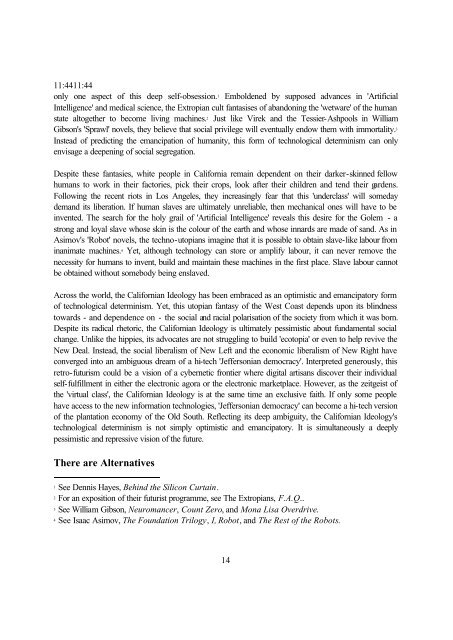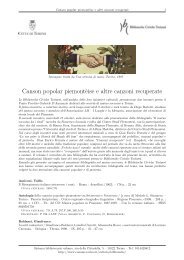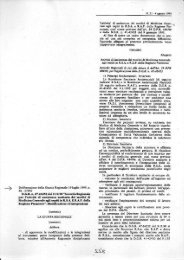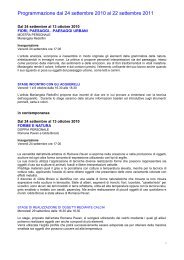THE CALIFORNIAN IDEOLOGY
THE CALIFORNIAN IDEOLOGY
THE CALIFORNIAN IDEOLOGY
You also want an ePaper? Increase the reach of your titles
YUMPU automatically turns print PDFs into web optimized ePapers that Google loves.
11:4411:44<br />
only one aspect of this deep self-obsession. 1 Emboldened by supposed advances in 'Artificial<br />
Intelligence' and medical science, the Extropian cult fantasises of abandoning the 'wetware' of the human<br />
state altogether to become living machines. 2 Just like Virek and the Tessier-Ashpools in William<br />
Gibson's 'Sprawl' novels, they believe that social privilege will eventually endow them with immortality. 3<br />
Instead of predicting the emancipation of humanity, this form of technological determinism can only<br />
envisage a deepening of social segregation.<br />
Despite these fantasies, white people in California remain dependent on their darker-skinned fellow<br />
humans to work in their factories, pick their crops, look after their children and tend their gardens.<br />
Following the recent riots in Los Angeles, they increasingly fear that this 'underclass' will someday<br />
demand its liberation. If human slaves are ultimately unreliable, then mechanical ones will have to be<br />
invented. The search for the holy grail of 'Artificial Intelligence' reveals this desire for the Golem - a<br />
strong and loyal slave whose skin is the colour of the earth and whose innards are made of sand. As in<br />
Asimov's 'Robot' novels, the techno-utopians imagine that it is possible to obtain slave-like labour from<br />
inanimate machines. 4 Yet, although technology can store or amplify labour, it can never remove the<br />
necessity for humans to invent, build and maintain these machines in the first place. Slave labour cannot<br />
be obtained without somebody being enslaved.<br />
Across the world, the Californian Ideology has been embraced as an optimistic and emancipatory form<br />
of technological determinism. Yet, this utopian fantasy of the West Coast depends upon its blindness<br />
towards - and dependence on - the social and racial polarisation of the society from which it was born.<br />
Despite its radical rhetoric, the Californian Ideology is ultimately pessimistic about fundamental social<br />
change. Unlike the hippies, its advocates are not struggling to build 'ecotopia' or even to help revive the<br />
New Deal. Instead, the social liberalism of New Left and the economic liberalism of New Right have<br />
converged into an ambiguous dream of a hi-tech 'Jeffersonian democracy'. Interpreted generously, this<br />
retro-futurism could be a vision of a cybernetic frontier where digital artisans discover their individual<br />
self-fulfillment in either the electronic agora or the electronic marketplace. However, as the zeitgeist of<br />
the 'virtual class', the Californian Ideology is at the same time an exclusive faith. If only some people<br />
have access to the new information technologies, 'Jeffersonian democracy' can become a hi-tech version<br />
of the plantation economy of the Old South. Reflecting its deep ambiguity, the Californian Ideology's<br />
technological determinism is not simply optimistic and emancipatory. It is simultaneously a deeply<br />
pessimistic and repressive vision of the future.<br />
There are Alternatives<br />
1<br />
See Dennis Hayes, Behind the Silicon Curtain.<br />
2<br />
For an exposition of their futurist programme, see The Extropians, F.A.Q..<br />
3<br />
See William Gibson, Neuromancer, Count Zero, and Mona Lisa Overdrive.<br />
4<br />
See Isaac Asimov, The Foundation Trilogy, I, Robot, and The Rest of the Robots.<br />
14
















